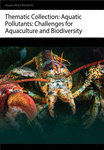Journal list menu
Export Citations
Download PDFs
Research Article
Open Access
oa
Impact of Green-Synthesized Zinc Oxide Nanoparticles (ZnO NPs) on the Biochemical and Histological Profiles of Cyprinus carpio
- First Published: 14 July 2025
Research Article
Open Access
oa
Microplastics in Commercial Fish Feed in Bangladesh: An Emergent Risk Factor for Aquaculture
- First Published: 16 June 2025
Research Article
Open Access
oa
Antimicrobial Residues and Heavy Metals in Aquaculture Farms Within Nairobi County, Kenya
- First Published: 01 June 2025
Research Article
Open Access
oa
A Hazard Index of Microplastics Contamination in Commercial Marine Fish Species and Mussels in the Southern Marmara Sea, Turkey
- First Published: 20 May 2025
Research Article
Open Access
oa
Evaluation of Chlorpyriphos as an Organophosphate Pesticide on Hematology, Blood Biochemistry, Antioxidant Capacity, Oxidative Stress, and Histopathological Changes in Juvenile Silver Barb (Barbonymus gonionotus)
- First Published: 12 May 2025
Research Article
Open Access
oa
Microplastic Pollution in Indigenous Fish From the Padma River, Bangladesh: A Case Study
- First Published: 16 April 2025
Research Article
Open Access
oa
Exploring the Coexposure Effects of Pyrogallol and Microplastic on the Red Swamp Crayfish Procambarus clarkii
- First Published: 15 April 2025
Research Article
Open Access
oa
The Effect of Oxytetracycline on the Immune Response and Expression of Immune-Related Genes in European Sea Bass (Dicentrarchus labrax, L. 1758)
- First Published: 21 March 2025
Research Article
Open Access
oa
Impacts of Voliam Flexi on Antioxidant Responses, Oxidative Stress, and Histopathological Changes in Juvenile African Catfish (Clarias gariepinus)
- First Published: 12 February 2025
Research Article
Open Access
oa
Effects of Macrobrachium nipponense on Phytoplankton Communities and Water Environmental Factors in Macrobrachium rosenbergii Culture
- First Published: 23 December 2024




